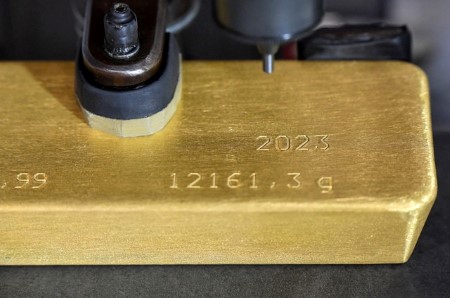




Policy Rate Updates: BSP outlook — cloudy with a chance of rate cut
 DOWNLOAD
DOWNLOAD

January Economic Update: Growth slows, prices rise
 DOWNLOAD
DOWNLOAD

Inflation Update: Up, up, and away?
 DOWNLOAD
DOWNLOAD


Gold wobbles as traders juggle hawkish Fed, weaker dollar

June 16 (Reuters) – Gold prices were choppy on Friday as investors juggled a hawkish Federal Reserve outlook on interest rates, which offset support from the dollar’s overall retreat this week.
Spot gold edged up 0.1% to USD 1,958.83 per ounce by 12 p.m. EDT (1800 GMT), en route to a 0.1% weekly dip. US gold futures settled nearly unchanged at USD 1,971.20.
“This is tough for gold because you have stocks that are continuing to rise and more hawkish Fed speak,” said Edward Moya, senior market analyst at OANDA.
“It appears that the markets are confident that the Fed is almost done with tightening because everyone’s going into stocks… which is dampening demand for safe havens.” .N
US central bank officials struck a hawkish tone in their first comments since their meeting this week, as a Fed report said inflation in key parts of the service industry “remains elevated and has not shown signs of easing”.
Weighing on appeal for zero-yield bullion, traders now saw a 74% chance of a rate hike in July, according to the CME’s FedWatch tool.
The hawkish comments seemed to counter support from both the dollar and weak jobless claims data on Thursday, as gold kept swinging back and forth between positive and negative territory.
On the flip side, “weakening employment and other foreign currencies working against the US dollar right now provide some tailwinds for gold,” said Phillip Streible, chief market strategist at Blue Line Futures, in Chicago.
The dollar index edged up, but was on course for its worst week in five months, making gold cheaper for overseas buyers.
Traders also took stock of the University of Michigan’s survey showing US consumers’ near-term inflation expectations dropped to a more than two-year low in June and the outlook over the next five years improved slightly.
Silver gained 1% to USD 24.10 per ounce, while platinum fell 0.3% to USD 982.62, both down for the week.
Palladium jumped 1.6% to USD 1,422.03, seeing its biggest weekly increase since November.
(Reporting by Deep Vakil in Bengaluru; Editing by Shailesh Kuber and Pooja Desai)
This article originally appeared on reuters.com





 By Reuters
By Reuters